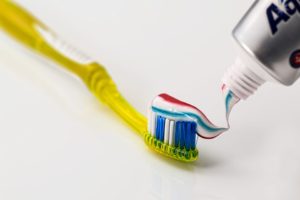Have you ever wondered how often you should be visiting our team? Being proactive rather than reactive with oral health could help prevent long term tooth loss and other dental problems.

According to a study published in the Journal of Dental Research titled “Patient Stratification for Preventive Care in Dentistry,” the American Dental Association (ADA) recommends working closely with your dentist to find a dental plan tailored to your needs. Researchers from the University of Michigan School of Dentistry found that individuals need different frequencies of visits to the dentist depending on three risk factors for periodontal disease: smoking, diabetes and interleukin-1 genetic variations. According to the research, high-risk patients would benefit from more frequent dental visits, while low-risk patients may be fine visiting their dentist once a year.
Many of our patients enjoy quarterly visits to our office. We’ve found more frequent professional cleanings reduces the risk of caries and periodontal disease. Our frequent visitors love having optimal oral health and confidence. Many dental professionals also choose to visit 3-4 times per year as well.
If you’re interested in creating an oral health plan which includes more frequent professional cleanings, contact us. We’re here for you





 Along with cooler weather and the end of year school break, winter brings the return of cold and flu season. When you are focused on a child with a fever, cough, or vomiting, it can be easy to question getting them out of the sickbed to brush their teeth. However, keeping mouths clean and teeth healthy can be even more important during illness. Here are some useful tips for protecting your child’s oral health when they’re sick.
Along with cooler weather and the end of year school break, winter brings the return of cold and flu season. When you are focused on a child with a fever, cough, or vomiting, it can be easy to question getting them out of the sickbed to brush their teeth. However, keeping mouths clean and teeth healthy can be even more important during illness. Here are some useful tips for protecting your child’s oral health when they’re sick. When buying a toothbrush, toothpaste, or coming in to our office, you often hear the word “plaque” associated with the health of your teeth. Plaque is one of the main reasons why it is so important to keep up with a daily oral hygiene routine that includes brushing two times each day for at least two minutes, and flossing regularly as well. Here’s what you need to know about plaque and what it can do to your smile.
When buying a toothbrush, toothpaste, or coming in to our office, you often hear the word “plaque” associated with the health of your teeth. Plaque is one of the main reasons why it is so important to keep up with a daily oral hygiene routine that includes brushing two times each day for at least two minutes, and flossing regularly as well. Here’s what you need to know about plaque and what it can do to your smile. If the idea of biting into an ice cream sandwich makes you cringe, you may be one of the millions of people who suffer from sensitive teeth. This is often caused by movement of fluid in the dentin – the soft inner tissue beneath the enamel of your tooth. This motion irritates the tooth nerve, creating a tingling sensation and sometimes pain.
If the idea of biting into an ice cream sandwich makes you cringe, you may be one of the millions of people who suffer from sensitive teeth. This is often caused by movement of fluid in the dentin – the soft inner tissue beneath the enamel of your tooth. This motion irritates the tooth nerve, creating a tingling sensation and sometimes pain. Due to the anxiety or embarrassment it can cause, halitosis – or bad breath – can be difficult for many people to face. However, clean-smelling breath may be easier than you think. Try these solutions to overcome halitosis and regain your confidence.
Due to the anxiety or embarrassment it can cause, halitosis – or bad breath – can be difficult for many people to face. However, clean-smelling breath may be easier than you think. Try these solutions to overcome halitosis and regain your confidence. Most serious oral health issues can be prevented by maintaining an effective routine of dental hygiene and in-office care. However, you could be at higher risk for some oral illnesses due to hereditary factors. Awareness and proper treatment can help minimize these risks. Here are a few of the most common oral health concerns that are affected by genetics.
Most serious oral health issues can be prevented by maintaining an effective routine of dental hygiene and in-office care. However, you could be at higher risk for some oral illnesses due to hereditary factors. Awareness and proper treatment can help minimize these risks. Here are a few of the most common oral health concerns that are affected by genetics. Are you embarrassed to show your smile because of missing teeth? For many people, missing teeth can create a feeling of diminished self-confidence. Modern dentistry can not only replace the gaps in your smile, our team can also create long-term replacements that look and feel just like your natural teeth. You have options. Here are a few of the most common tooth replacement solutions.
Are you embarrassed to show your smile because of missing teeth? For many people, missing teeth can create a feeling of diminished self-confidence. Modern dentistry can not only replace the gaps in your smile, our team can also create long-term replacements that look and feel just like your natural teeth. You have options. Here are a few of the most common tooth replacement solutions.